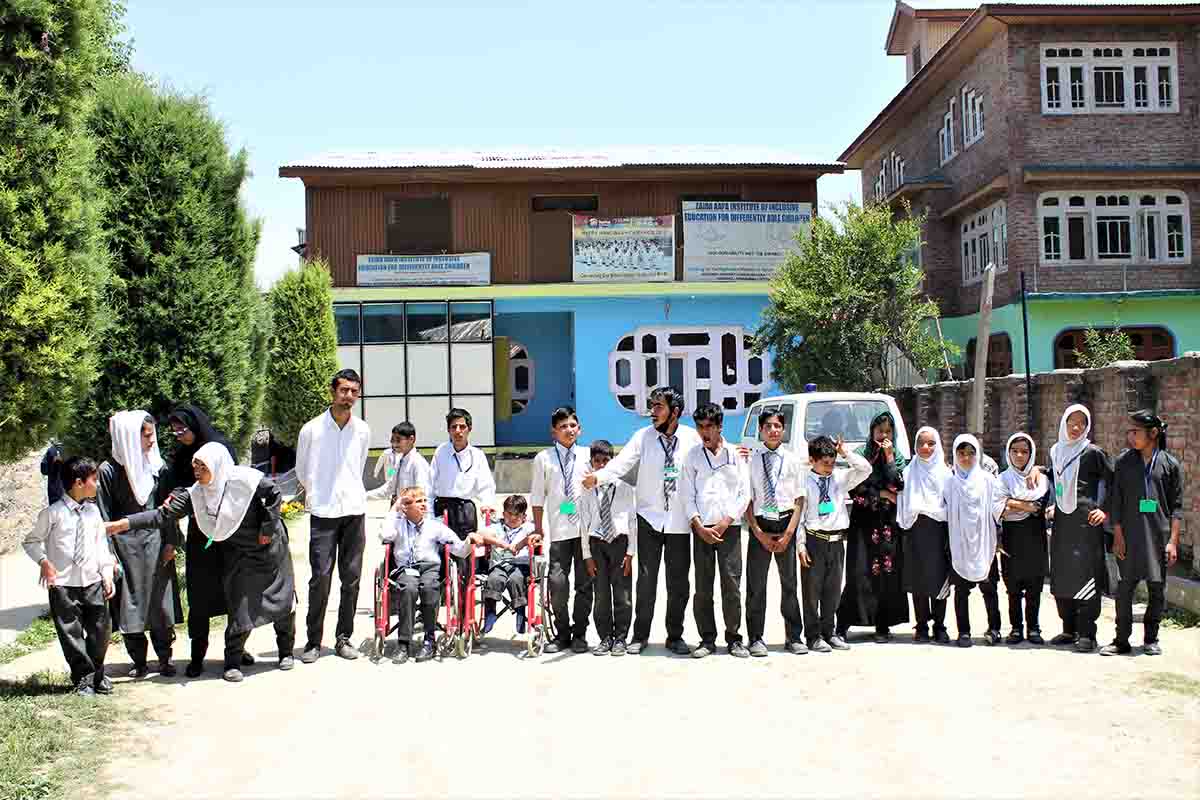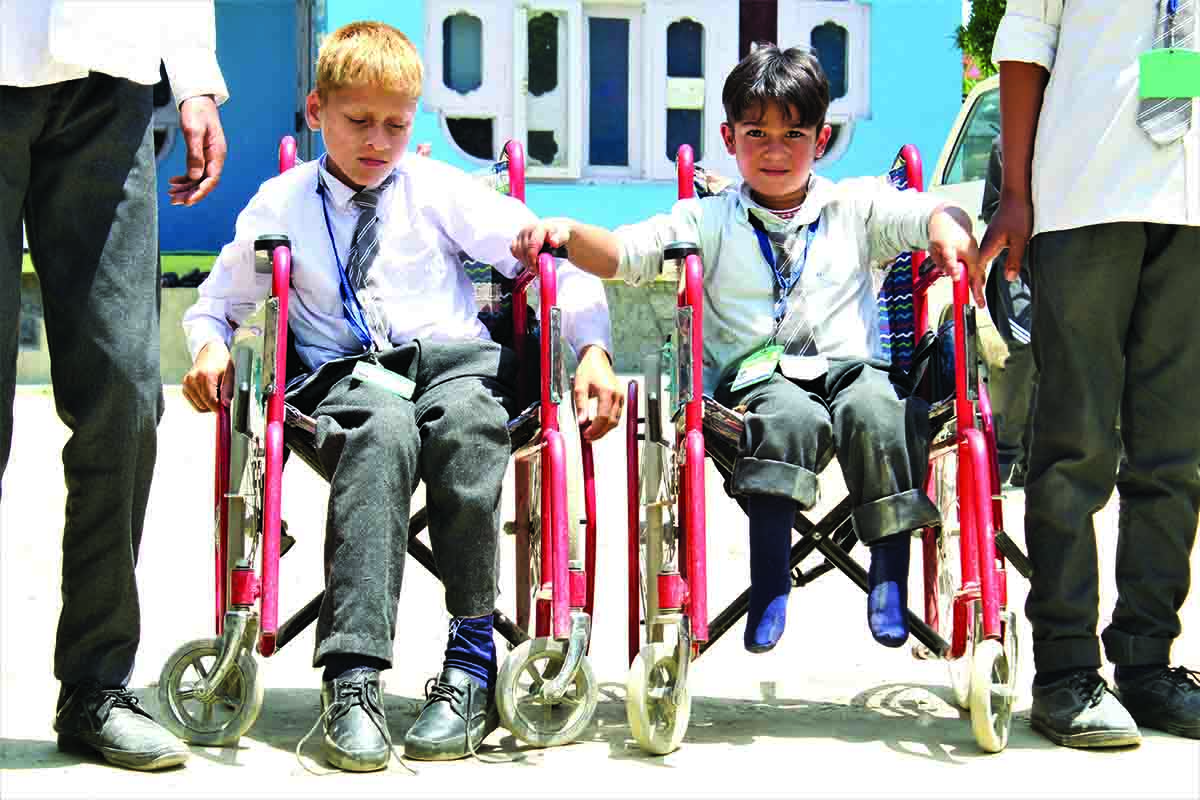After unknown gunmen left a young science graduate to survive crippled, he felt the pain of the people with serious disabilities. A few years later, he set up a school that teaches more than 100 handicapped students and is the only such facility in south Kashmir
In 1997, when Javed Ahmad Tak, a Bijbehara resident, completed his bachelor’s in sciences, he had his future plans ready. But fate had chosen something different for him.
In March 1997, Tak was at his uncle’s home and during the night, some unidentified masked men barged in and wanted to kidnap his cousin. Tak pleaded for his release.

“Before I would say something more, they pumped bullets into my body, damaging my kidney, liver, intestine, spinal cord and spleen,” Tak said. After a month in the hospital, Tak miraculously survived but remained crippled.
After three years he came out from the confines of his room and pursued his post-graduation in Social Work from the University of Kashmir. In 2000, he founded a Non-Governmental Organisation Humanity Welfare Organization Helpline for the welfare of the poor and physically disabled persons.
Being physically disabled, Tak realised the crisis of this population. In 2008, Tak set up Zaiba Aapa Institute of Inclusive Education. In the beginning, it was only for visually impaired children but with the passage of time, it started taking care of children with other disabilities.
“As this school was established particularly for the visually impaired children but when the parents of those children with other disabilities started coming here and requested us to allow their children to study here, then we were left with no options,” Aadil Rashid Vaid, the school principal, said.
Located in Bijbehara, barely a few meters away from the Srinagar-Jammu highway, this middle-school (up to eighth class) is operating from a rented residential house. In the beginning, only three students were studying in this school. It was much later that the number of children swelled. Presently more than 100 students are enrolled in this school and around 15 staffers take care of them.
“As the school caters education to every type of physically disabled child so different teaching methods are used for teaching students with different disabilities,” Vaid said. “For visually impaired, we use braille method and for deaf and dumb we use the sign language.”
The institute owns a few machines meant for the orthopedically disabled students. Some students use these machines with the help of trained staff. These machines help students with minor deformities to walk properly without any support.

The school has not any fixed fee system. “It is up to the parents of these children what they are capable to pay,” Vaid said. “Some pay normally, some meagrely and some nothing at all. It all depends on their financial condition.” Right now, most of the funding “comes mainly from the Public donation.” Off late, some off-shore charities are helping this institution. In last four years, it has received Rs 62,21,103 from different institutions which work for disabled population.
Mudasir Hussain is one of the senior teachers at the institute. “Students studying here are physically disabled but we encourage them not to live with any kind of inferiority complex,” Hussain said. “This complex impacts the psychological growth of any child.”
Zaiba Aapa Institute is the only school of its kind in entire South Kashmir. There are quite a few schools across Kashmir where education is imparted for all the differently-abled students. The roll call in the school offers the idea about the areas from which the students come and join this school. All are from South Kashmir.
But who is Zaiba Aapa, the woman in whose name such an exclusive facility is named? There is an interesting story behind it. In the 1950s a woman used to live in Bijbehara and her name was Zaiba. The woman was none other than the grandmother of Javed Ahmad Tak. People would call her by the name Zaiba Aapa out of love and respect.
“Whenever anyone in Bijbehara area would receive severe burn injuries, then Zaiba Aapa would voluntarily visit the forests and bring medicinal herbs for the injured as there were no so many medical facilities around, that time. This was totally a voluntarily work by Zaiba Aapa and she was not making any money out of this passion. “This was the only reason why the school was named after Zaiba Aapa,” Sajad Ahmad Tak said.
How do the students feel?
Almost all students have one thing to share. “Had there not been this school here,” Shugufta, whose son is studying in the school for many years said. “My son instead of studying would have been sitting idle at home.” Some parents had migrated to stay closer to Srinagar so that their specially-abled wards would get some sort of education.
The school has a very good academic record. Many students of this school have excelled in top exams. Zakia Manzoor, a girl who is 100 per cent visually impaired was the product of the Zaiba Aapa school. 2017, she shined in her matriculation exam securing 85 per cent marks.
Although the school is presently operating from a residential house a three-storied concrete building is under construction in Simthan area, not far away from Bijbehara. “This building will not be a normal building but it is being specially constructed and designed in accordance with the needs and comfort of the physically disabled children,” Vaid said.
